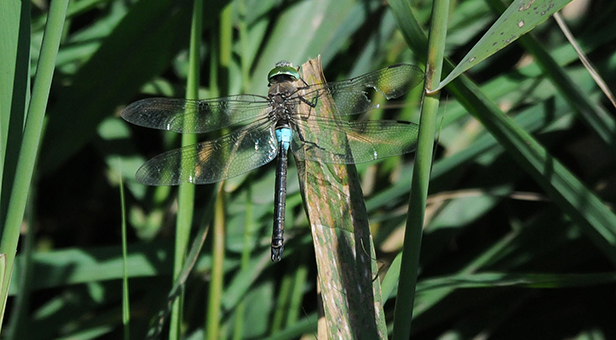
At just over 7cm long, the Lesser Emperor, (Anax parthenope) is related to the much more common Emperor dragonfly but can be distinguished by its bright blue ‘saddle’ and green eyes
A rare dragonfly is now thought to have bred successfully at Moors Valley Country Park near Ringwood.
First recorded in Britain in 1996, the Lesser Emperor (Anax parthenope) is one of several species of dragonfly to have come over from Europe in the last 20 years to set up home in Britain. Two confirmed sightings have been recorded at the park in the last month.
Dragonflies can spend up to four years of their lives as underwater nymphs before emerging for a few short weeks as they mate and entertain us with their stunning aerial acrobatics.
In southern parts of the continent, the Lesser Emperor has a two year life cycle. Further north this may be extended to three years. As one was last seen at Moors Valley in 2011, it is thought that the current sightings are the offspring of a small mass migration three years ago.
Keith Powrie has been recording dragonflies at the Park for the last 12 years, “Moors Valley is one of the best sites in the country to spot dragonflies,” he said. “There are 45 species in the UK and 28 have been recorded at the Park with 26 species having bred in its lakes, ponds and slow moving rivers. Moors Valley offers the perfect environment for both dragonflies and damselflies and I am truly delighted that we can now add the rare Lesser Emperor to its resident population.”
Looking after the environment is an important part of the work of the park’s rangers and income from car parking directly supports a wide range of initiatives including the park’s water vole reintroduction programme and extensive recordings of dragonflies, damselflies, butterflies and birds.
There is no entrance fee to Moors Valley so paid parking is vital to ensuring the continuing success of the park. Visitors will soon be seeing a series of new posters at Moors Valley explaining a little bit more about how their parking fees are spent, and letting them know that the rangers and Moors Valley’s wildlife are both very grateful.






